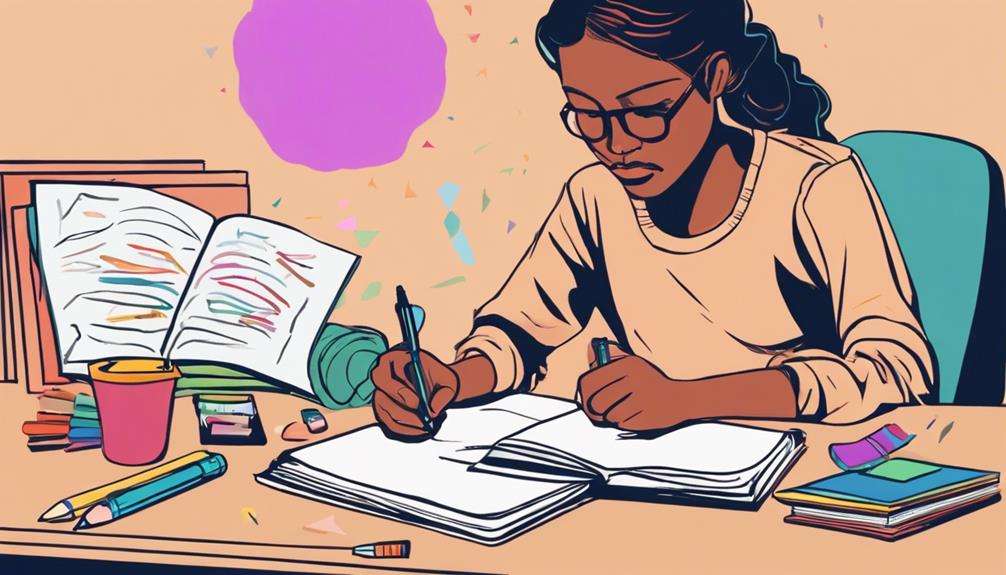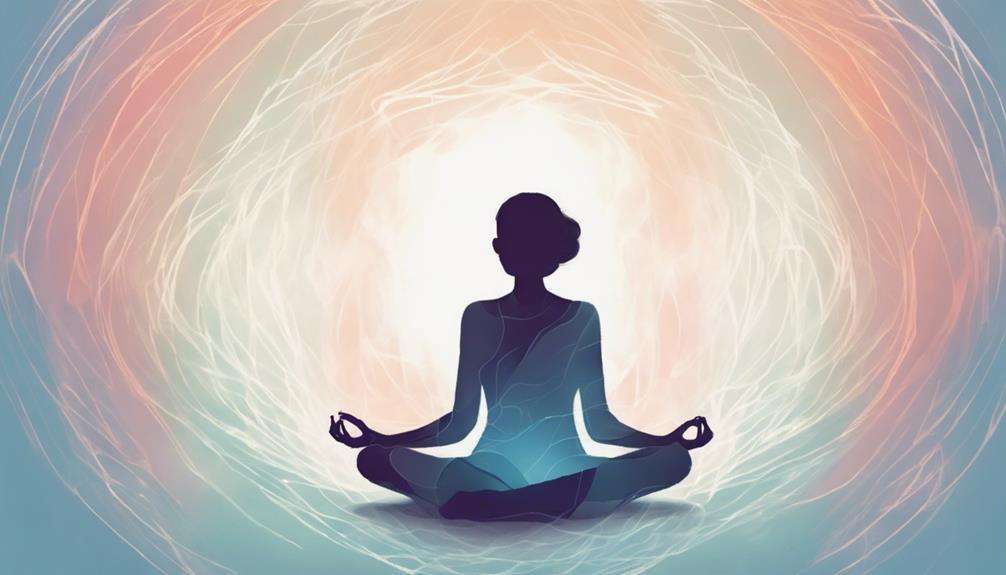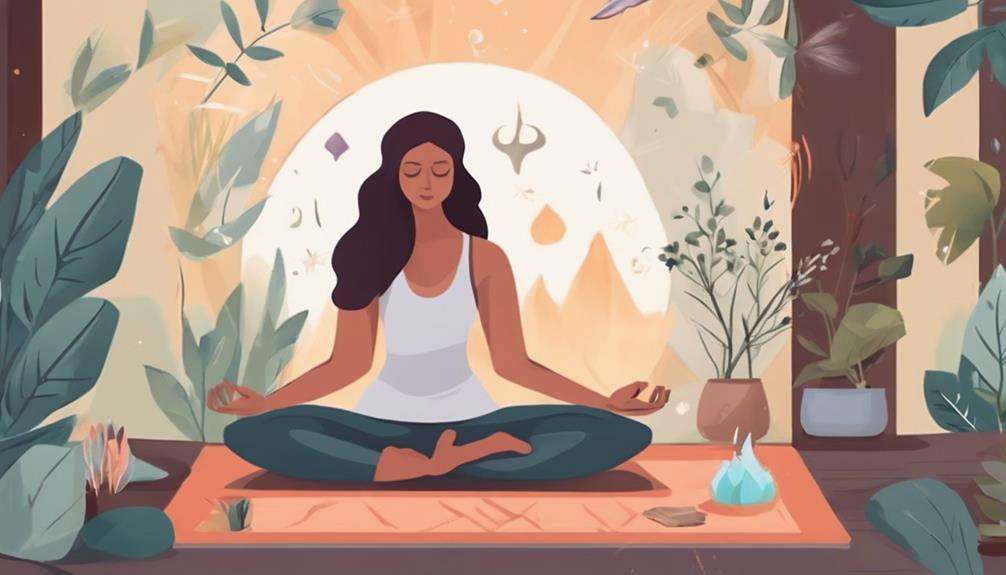When facing anxiety, it's common to feel overwhelmed by the idea of adding mindfulness practices to your routine. However, taking small steps towards incorporating mindfulness can significantly impact your ability to manage anxious thoughts.
By exploring simple yet effective mindfulness techniques, you can start cultivating a sense of peace and control amidst the chaos of anxiety.
Discover how grounding exercises, deep breathing techniques, and other mindfulness practices can provide you with the tools to navigate through moments of anxiety with more ease and clarity.
Key Takeaways
- Reduce anxiety by incorporating deep breathing and body scan meditation.
- Cultivate self-awareness and emotional balance through mindfulness practices.
- Enhance clarity and compassion in responding to anxiety triggers with mindfulness.
- Manage anxiety effectively by staying present and releasing tension through mindfulness techniques.
Mindfulness Techniques for Anxiety Relief
To manage anxiety effectively, incorporating mindfulness techniques such as deep breathing and body scan meditation can provide relief by promoting relaxation and focus. Mindfulness involves paying attention to your thoughts, emotions, and body in a non-judgmental way. By practicing mindfulness, you can become more aware of the present moment and better manage stressful situations that trigger anxiety.
When you engage in mindfulness meditation, you direct your attention to the sensations in your body or the rhythm of your breath. This practice helps you anchor yourself in the present, allowing you to let go of worries about the future or regrets about the past. By bringing your focus to the sensations in your body, you can release tension and stress, which are often physical manifestations of anxiety.
Mindfulness meditation can also help you observe your thoughts and emotions without getting overwhelmed by them. This awareness enables you to respond to anxiety with more clarity and compassion, rather than reacting impulsively. By incorporating mindfulness techniques into your daily routine, you can cultivate a greater sense of calm and resilience in the face of anxiety.
Benefits of Yoga Therapy for Anxiety
Incorporating yoga therapy into your anxiety management routine can offer a range of benefits for promoting relaxation, reducing stress, and enhancing emotional well-being. Here are some key advantages of utilizing yoga therapy for managing anxiety:
- Reduce Symptoms of Anxiety: Yoga therapy has been shown to effectively decrease symptoms of anxiety by promoting relaxation and reducing the levels of stress hormones in your body.
- Enhance Emotional Well-being: Engaging in mindful movement through yoga can help you connect with your body, release tension, and cultivate inner peace, all of which contribute to enhancing your emotional well-being and reducing anxiety levels.
- Holistic Approach to Managing Anxiety: Yoga practices such as deep breathing, gentle stretching, and meditation provide a holistic approach to anxiety management. By calming both your mind and body, yoga therapy empowers you to take a comprehensive approach to managing anxiety, fostering self-awareness and promoting overall emotional balance.
Meditation Practices for Anxiety Management

Engage in various meditation practices to effectively manage and alleviate symptoms of anxiety.
Mindfulness Meditation involves focusing on the present moment, helping reduce worry and anxious feelings.
Body Scan meditation promotes relaxation by bringing awareness to different parts of the body, releasing tension and stress.
Deep Breathing exercises calm the mind and body, aiding in anxiety management.
Loving-Kindness Meditation fosters self-compassion, diminishing the impact of anxiety on your well-being.
Visualization Techniques create positive mental images, aiding in anxiety and stress reduction.
By incorporating these practices into your routine, you can develop mindful awareness and cultivate a sense of peace amidst anxiety symptoms.
These mindfulness practices can complement therapy for depression by providing you with tools to cope with anxious thoughts and emotions.
Embrace these meditation techniques to nurture your mental health and well-being, finding moments of tranquility and calmness in the midst of anxiety.
Mindful Breathing Exercises for Anxiety
How can mindful breathing exercises help in managing anxiety effectively?
Mindful breathing involves focusing on your breath to anchor yourself in the present moment, offering a powerful tool to combat anxiety. Here's how it works:
- Activating the Parasympathetic Nervous System: Deep diaphragmatic breathing, a key component of mindful breathing, can stimulate the parasympathetic nervous system. This activation helps reduce anxiety symptoms such as rapid heart rate and shallow breathing, promoting a sense of calmness.
- Calming the Mind: Counting breaths or incorporating visualizations while practicing mindful breathing can assist in quieting the mind and alleviating feelings of panic or worry. By engaging in these exercises regularly, you can cultivate a sense of peace and stability in the face of anxiety triggers.
- Enhancing Emotional Regulation and Well-being: Research indicates that the consistent practice of mindful breathing can improve emotional regulation, lower stress levels, and enhance overall well-being. By integrating mindful breathing exercises into your daily routine, you can effectively manage anxiety and experience greater ease in various aspects of your life.
Grounding Techniques for Anxiety Reduction

To further enhance your anxiety management toolkit, exploring grounding techniques can provide valuable support in moments of heightened stress and unease. Grounding techniques involve focusing on the present moment to reduce anxiety symptoms effectively.
By practicing techniques like breath awareness and square breathing, you can detach from anxious thoughts and center your attention on what you can control. These exercises help individuals stay grounded during anxious situations, allowing for a clearer perspective and a calmer mind.
Regular practice of grounding techniques not only aids in managing anxiety but also enhances mindfulness and reduces reactivity to anxiety triggers. By incorporating grounding exercises into your daily routine, you can cultivate a sense of presence and resilience that allows you to navigate stressful situations with greater ease.
Mindfulness Walks to Alleviate Anxiety
Embark on mindful walks to alleviate anxiety by immersing yourself in the present moment through focused attention on your surroundings. Mindfulness walks offer a powerful way to reduce anxiety, improve mood, and increase calmness. Here's how they can benefit you:
- Connection with Nature: Walking in natural settings or green spaces enhances the soothing effects of mindfulness walks, promoting relaxation and reducing stress.
- Social Connection: Whether walking alone or in a group, mindfulness walks provide an opportunity for social connection and support, which can further boost your mental well-being.
- Incorporating into Daily Routine: By integrating mindfulness walks into your daily routine, you can effectively manage anxiety, enhance your overall mental well-being, and establish a consistent mindfulness practice.
Journaling for Anxiety Awareness

Start your journey towards anxiety awareness by engaging in the practice of journaling, a powerful tool for gaining insight into your thoughts and emotions. Journaling for anxiety awareness involves the act of writing down your thoughts, feelings, and triggers to better understand the patterns that contribute to your anxiety. By reflecting on your journal entries, you can begin to identify recurring themes and behaviors that may be exacerbating your anxiety levels. This process provides a safe space for you to express your emotions, fears, and concerns related to anxiety, allowing for a deeper exploration of your inner world.
Moreover, keeping a journal can help you track your progress in managing anxiety symptoms and developing effective coping strategies. Research indicates that journaling can reduce anxiety, improve mood, and enhance self-awareness, making it a valuable tool in the journey towards managing anxiety. Through regular journaling, you can gain a better understanding of your triggers and emotions, ultimately empowering yourself to navigate the challenges of anxiety with mindfulness and self-awareness.
Mindfulness Apps for Anxiety Support
Begin exploring the world of mindfulness apps to support your journey in managing anxiety more effectively. Utilizing apps like Calm can provide you with essential tools and resources for stress management and mental well-being. Here are three key features of the Calm app that can help you navigate anxiety support:
- Personalized Stress Management: The Calm app offers personalized content and tools tailored to help you effectively manage stress and anxiety in your daily life.
- Free Mindfulness Training: Take advantage of the Calm Schools Mindfulness Program, which provides free mindfulness training for teachers. This program can help improve focus, reduce stress, and enhance present-moment awareness.
- Daily Mindfulness Practices: Accessible support for your mental well-being is available through the Calm app, offering daily mindfulness practices that can contribute to a more balanced and focused mindset. By incorporating these practices into your routine, you can work towards improving your overall mental health and well-being, promoting a sense of calm and resilience in the face of anxiety.
Frequently Asked Questions
What Is the 3 3 3 Rule for Anxiety?
When dealing with anxiety, remember the 3 3 3 rule: name three things you see, hear, and feel around you. Grounding yourself in the present moment can help shift focus from anxiety to calmness.
How Mindfulness Can Reduce Anxiety?
When you practice mindfulness, you tap into the power of the present moment. By focusing on your breath and staying grounded, you can reduce stress, improve your mind-body connection, and develop coping strategies for anxiety.
What Are the Techniques for Managing Anxiety?
When managing anxiety, practice deep breathing, meditation, grounding techniques, and guided imagery. Utilize progressive muscle relaxation, self-care strategies, coping skills, and stress management. Enhance your mind-body connection and regulate emotions through these beneficial practices.
What Is the Best Exercise for Anxiety?
To manage anxiety effectively, deep breathing and progressive muscle relaxation are key. Ground yourself with grounding techniques, yoga poses, and guided meditation. Try journaling therapy, nature walks, and creative visualization. Embrace relaxation exercises and mindful movement for peace.
Conclusion
As you continue to practice mindfulness techniques for managing anxiety, you'll begin to notice a shift in how you relate to your stress and worries.
By incorporating yoga therapy, meditation practices, breathing exercises, grounding techniques, mindful walks, journaling, and mindfulness apps into your daily routine, you're taking proactive steps towards cultivating a sense of calm and self-awareness.
Keep exploring and experimenting with these tools to discover what works best for you in your journey towards anxiety relief.






